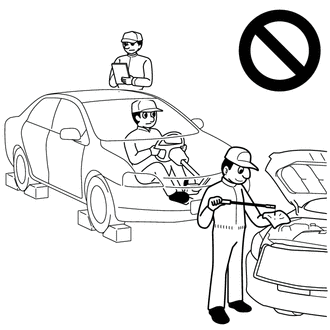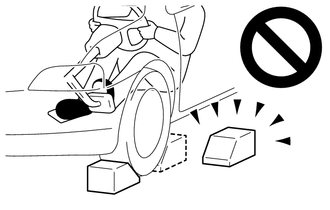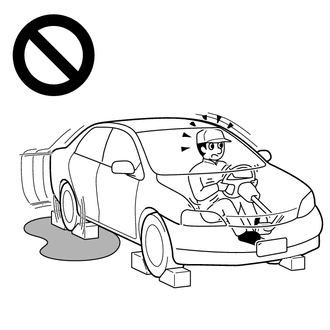| Last Modified: 07-31-2024 | 6.11:8.1.0 | Doc ID: RM100000001HSSM |
| Model Year Start: 2020 | Model: Corolla Hatchback | Prod Date Range: [03/2019 - 09/2022] |
| Title: K120 / K121 (CVT): K120 CONTINUOUSLY VARIABLE TRANSAXLE SYSTEM: HYDRAULIC TEST; 2020 - 2022 MY Corolla Corolla Hatchback [03/2019 - 09/2022] | ||
HYDRAULIC TEST
PERFORM HYDRAULIC TEST
CAUTION:
-
Do not perform a stall test if there are any people or objects near the vehicle.

- The vehicle could begin moving suddenly, resulting in a serious accident.
-
Do not perform a stall test if any wheel chocks are out of position.

- The vehicle could begin moving suddenly, resulting in a serious accident.
-
Do not perform the stall test on a slippery or low-friction surface that could allow the tires to spin.

- The vehicle could begin moving suddenly, resulting in a serious accident.
(a) Measure the secondary oil pressure.
CAUTION:
A secondary oil pressure test should always be carried out with at least 2 people. One person should observe the condition of the wheels and wheel chocks while the other is performing the test.
NOTICE:
- This test must be performed after checking and confirming that the engine is normal.
- Perform this test with the CVT fluid temperature between 50 and 100°C (122 and 212°F).
- Perform this test with the air conditioning off.
- Do not perform the stall speed test for more than 5 seconds.
- When performing the stall speed test repeatedly, wait for 15 seconds or more between tests.
-
w/ Electric Parking Brake System:
Perform this test with the AUTO function (shift-linked function) of the electric parking brake system off.
(1) Fully apply the parking brake and chock all 4 wheels.
HINT:
w/ Electric Parking Brake System:
When the parking brake indicator (red) is illuminated after the electric parking brake switch (electric parking brake switch assembly) has been pulled to the lock side, the maximum amount of braking force is applied if the electric parking brake switch (electric parking brake switch assembly) is pulled to the lock side one more time.
(2) Connect the Techstream to the DLC3.
(3) Start the engine.
(4) Turn the Techstream on.
(5) Enter the following menus: Powertrain / Transmission / Active Test / Activate the TC Terminal.
HINT:
Observe the value of Belt Clamping Force Sensor in the Data List while performing the Active Test.
Powertrain > Transmission > Active Test
|
Active Test Display |
|---|
|
Activate the TC Terminal |
|
Data List Display |
|---|
|
Belt Clamping Force Sensor |
(6) Keep your left foot firmly on the brake pedal and move the shift lever to D.
(7) Depress the accelerator pedal as much as possible with your right foot. Quickly read the highest secondary oil pressure reading when the engine speed reaches stall speed and release the accelerator pedal immediately.
(8) Keep your left foot firmly on the brake pedal and move the shift lever to R.
(9) Depress the accelerator pedal as much as possible with your right foot. Quickly read the highest secondary oil pressure reading when the engine speed reaches stall speed and release the accelerator pedal immediately.
Specified Secondary Oil Pressure:
|
Stall Speed |
Shift Lever Position |
Secondary Oil Pressure |
|---|---|---|
|
2350 +/- 300 rpm |
D |
3.5 to 4.3 MPa (35.7 to 43.8 kgf/cm2, 508 to 624 psi) |
|
R |
1.6 to 2.4 MPa (16.3 to 24.5 kgf/cm2, 232 to 348 psi) |
HINT:
If the secondary oil pressure is out of the specified range, a solenoid valve, regulator valve or modulator valve may be malfunctioning.
|
|
|